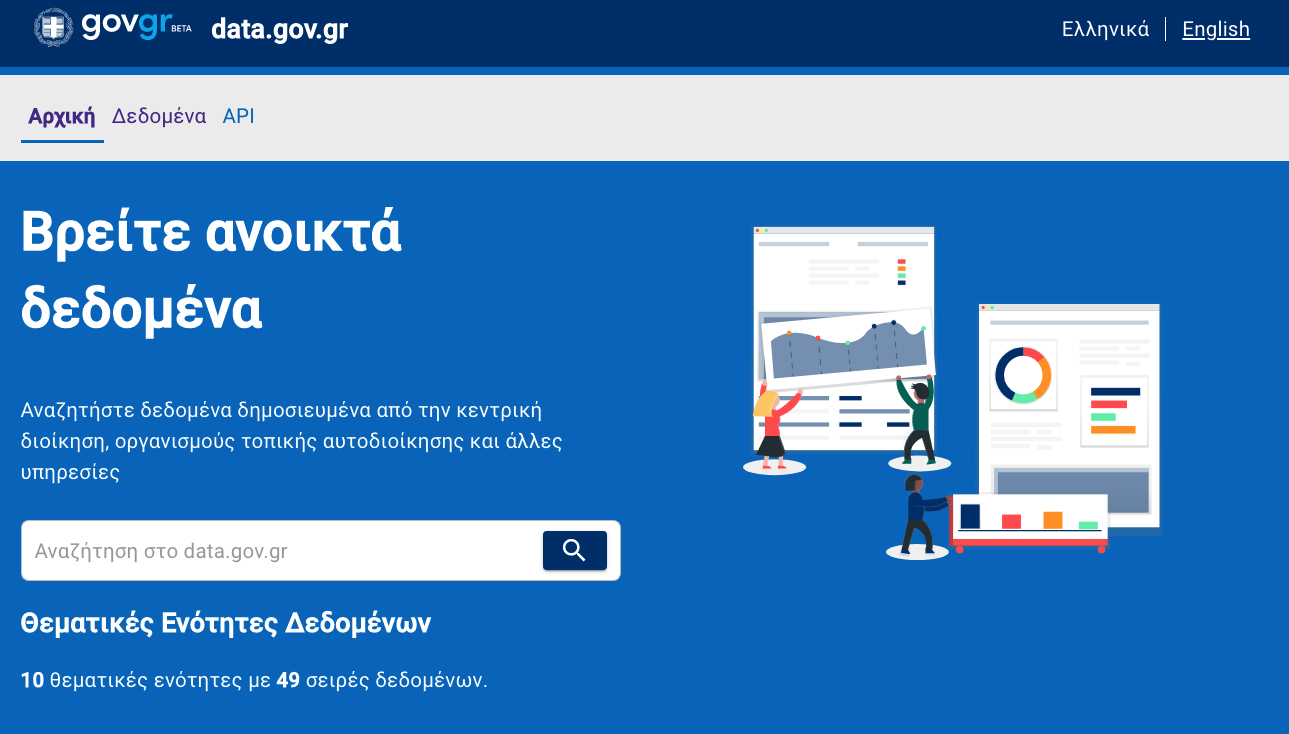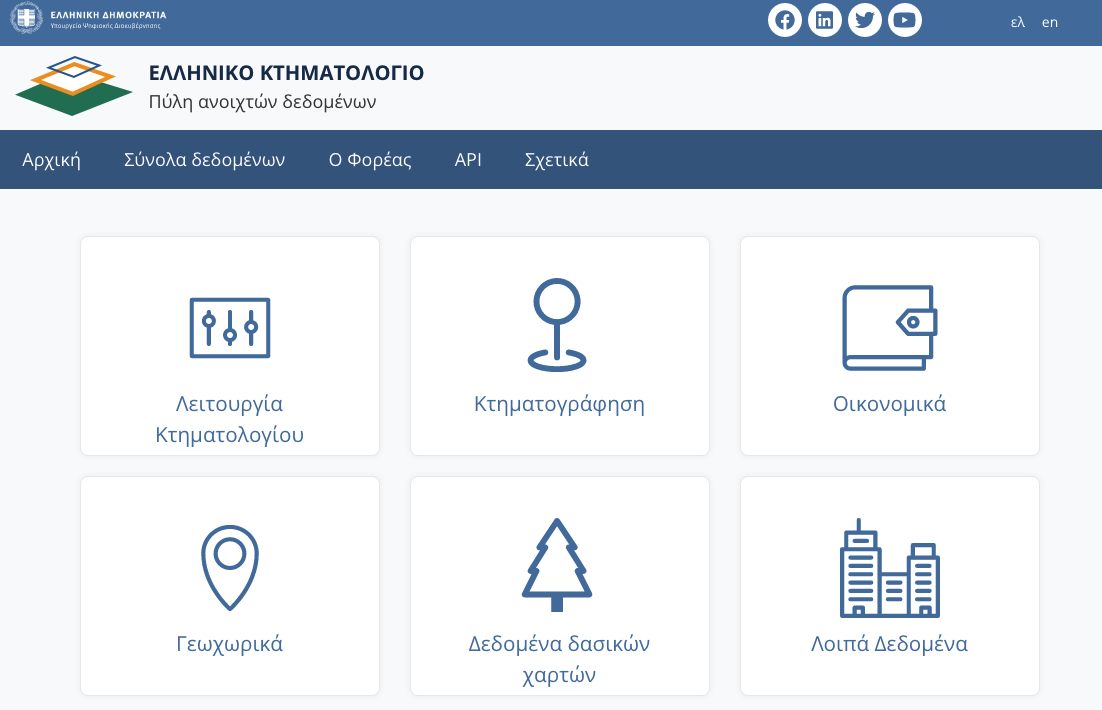Despite Greece’s previous status as a trailblazer in open data over the past decade, the country’s current rank among the lowest in Europe hinders private sector economic growth and results in a lack of monitoring those in power, as well as transparency and accountability. How did the shift from the pioneering Transparency Programme (Diavgeia) to data secrecy occur, as exemplified by the withholding of the list of significant public debtors and the refusal to disclose crucial epidemiological data during the pandemic?

Each December, the Transparency Programme commemorates its anniversary. In 2022, the initiative, which was introduced by George Papandreou’s administration, marked its 12th year and was a significant milestone for Greece in terms of open data availability. The pioneering aspect of the programme was the establishment of an online platform where all actions of the Public Administration had to be posted in machine-readable form to be considered valid and executable. The Internet Uploading Number (IUN), introduced as part of this programme, became a mandatory requirement for public works contracts, procurement, and other administrative processes. “This innovation was crucial to the success of the Transparency Programme (Diavgeia) and resulted in widespread training. Between 2010 and 2011, extensive training of all entities that were required to post all their acts on the platform took place,” said Alexandros Melidis, Director General of the Open Technologies Alliance (GFOSS), in an interview with iMedD. Founded in 2008 with shareholders from universities, research centers, and public benefit organisations, GFOSS has been actively advocating and contributing to openness in Greece.

Photo: Alexandros Avramidis
According to Michalis Vafopoulos, a renowned author and researcher in the fields of data science and the internet, “The establishment of the Transparency Programme had a profound impact on my life and career. I was amazed when I read the explanatory memorandum of the public and private interest bill.” In 2010, Michalis Vafopoulos launched the PublicSpending initiative, which interconnects and analyses public spending in Greece and internationally based on the data available through the Transparency Programme. He is currently the director of the Open Data Institute and the MyData Hub Greece of the Open Technologies Alliance (GFOSS), and also serves as a board member of the Hellenic Cadastre. In 2018, he founded Linked Business, an award-winning start-up that specialises in market intelligence and is based at Lefkippos Tech Park, a unit of NCSR Demokritos.
The endeavor was left unfinished
Despite the passage of relevant legislation in 2014 and 2020, which were intended to transpose European directives, Greece has made few substantial strides towards making updated and unclassified state data publicly available since 2010. According to Alexandros Melidis, “Transposing a European directive is one thing, but implementing it in practice is an entirely different story. The lack of progress in open data in Greece today can be attributed to the failure to find a legally intelligent way, like the Transparency Programme, to impose sanctions on public administration bodies that fail to upload their datasets in open machine-readable form, particularly those that are of high value,” he points out. The Open Data Directive identifies six categories of high-value datasets, including:
- geospatial
- earth observation and environment
- meteorological
- statistics
- companies and company ownership
- mobility
The response of the Ministry of Digital Governance
The Ministry of Digital Governance (MDG) has announced that the Regulation on high-value datasets was published in the Official Journal of the European Union on January 20th, 2023. The Regulation aims to establish a list of specific high-value datasets and define frameworks for their publication and use. As a Regulation, it does not need to be incorporated into national law and has an immediate compliance obligation. The MDG is currently considering issuing an interpretative or clarifying circular to stakeholders in light of the Regulation.
When asked about the matter, the Ministry of Digital Governance stated: “The legal and regulatory framework is being examined so that something like this can be supported at a substantial level with tangible results.” However, no specific timetable has been set for these changes.
In October 2018, the Federation of Enterprises and Industries (SEV) reported that despite the adoption of Law 4305/2014 on the open availability and re-use of public sector documents, information, and data, the results in Greece have been poor due to limited response from public organisations and a lack of clear strategy from the State. “The ambitious effort that started at the beginning of the decade with the Transparency Programme was left unfinished and seems to have been abandoned. Yet open public data, as a subset of big data, is a key pillar of the digital transformation of the state and the economy,” SEV wrote. “They can make a significant contribution to the development of entrepreneurship, job creation, cost reduction, administrative simplification, resource savings, the efficiency of services provided to citizens and businesses through the standardisation of processes and their evaluation by the public, and ultimately transparency,” stated SEV. “And accountability,” added those who were interviewed on the matter.
The ministry claims that they implemented the framework set by Law 4305/2014 through the ministerial decision of 30 April 2020 (B 1709/2020), which outlined the operational and technical requirements for the availability of open data from critical registers of the Greek public administration. This decision laid out the guidelines and procedures that each organisation should adhere to in order to make their collected data readily available for processing and use. However, despite these efforts, the responses suggest that much work still needs to be done almost three years later.
“The Ministerial Decision pertains to anonymised public data which covers a wide range of activities such as birth rates, unemployment rates, economic activity data, and vehicle ages. The availability of this data will now be structured and technically sound, with a focus on protecting personal data. Specific datasets that will be made available include the citizens’ register, tax and insurance register, car registration license register, and the ‘Ergani’ information system. Additionally, traffic data, economic activity data, ferry, air, and urban travel data will be accessible through the central public data directory, data.gov.gr.

More specifically, the Ministry has already made traffic, urban transport, and ferry route datasets available on the data.gov.gr portal, while other datasets like the citizens’ register are currently being implemented in collaboration with relevant ministries, competent bodies, and contractors.
Finally, with the implementation of the new open public data platform ‘data.gov.gr’, which utilises modern technologies and an open software infrastructure, the public can now access at least 20 new datasets. These include validations of travel/transfer to OASA’s (Athens Public Transport Authority) fixed transport and bus lines, data from the cadastre, information on energy consumption and production, COVID-19 vaccination data, and more.
It is important to stress that the portal is continuously being enhanced, just like many other gov.gr services. Although it may have fewer numerical datasets, the new portal boasts datasets of higher quality and better standards. At the Ministry of Digital Governance, we are continually striving to find the perfect formula for digital services. Furthermore, the ongoing improvements to the portal are somewhat related to the enabling provisions that are still pending signature and publication.”
The availability of public data, including the list of major debtors to the government, has been discontinued
Following the implementation of the Transparency Programme, two major platforms were created: the Central Electronic Public Procurement Registry(KIMDIS), which publishes all public procurement notices exceeding 2,500 euros, and the General Commercial Registry (GEMI), which provides public access to company founding documents, balance sheets, resolutions of General Assemblies, and articles of association, among other things. However, while these platforms are publicly accessible, they are not considered “open data.” Similarly, the National Printing House website, which existed prior to the Transparency Programme and has since undergone a visual renewal, also falls under this category.
In Greece, even data that were previously public, such as the list of large public debtors (legal and natural persons with debts of more than 150,000 euros to social security funds and the tax authorities), have ceased to be published until further notice. This happened initially under the pretext of the coronavirus pandemic and subsequently without any substantial justification.

“What has caught our attention in recent years, and not just ours, is the disclosure of MPs’ interests. They have the ability to make them public in a computer-readable format, which they should, but they choose not to,” said Dr. Angelos Kaskanis, Executive Director of Transparency International Greece, expressing his concern.
The New ‘Diavgeia’ is Underway
The Ministry of Digital Governance has responded to iMEdD and stated that they are currently in the preparation stage for the new version of the Transparency Programme, called “The New Transparency”.
According to the Ministry of Digital Governance, “KIMDIS is currently accessible to the public, but it does not yet support API technologies. However, it is expected that the next upgrade of the information system will support such functionalities. Meanwhile, GEMI imposes a charge for accessing its data based on a Joint Ministerial Decision, but it has not been implemented due to technical reasons faced by the General Accounting Office (GAO), despite having an API. The Ministry of Digital Governance is currently participating in the steer data programme, which aims to improve the interoperability of commercial registers. The ministry also acknowledges the potential benefits of making the data of these registers more accessible, but this requires cooperation with stakeholders and the establishment of an appropriate framework for such access.”
Greece is severely lagging behind
Alexandros Melidis explains that every December, the European Union publishes the Open Data Maturity Report, which assesses the progress of 35 countries, including the 27 EU member states and some candidate countries in the European Free Trade Area. According to Melidis, “Greece is severely lagging behind in open data issues.” He goes on to explain that countries are scored and grouped into four categories based on their progress: trendsetters, fast trackers, followers, and beginners. “Greece has fallen into the fourth category, which includes Latvia, Malta, Slovakia, Iceland, Albania, Bosnia and Herzegovina, and Montenegro. However, in 2015, the country was considered a trendsetter.” When asked why Greece was in a better position back then, Melidis credits the recent integration of the European directive and several successful open data projects, including YourDataStories, which was designed by Michalis Vafopoulos, GFOSS, and the relevant ministry. He also adds that the Transparency Programme was still in its prime and had just released its next edition, while there was also an open data portal that complied with international standards during that period.
“Opening up data can provide public value by promoting public interest, transparency, accountability, and informed decision-making by governments. It also facilitates citizens in keeping themselves informed about the actions of their government.”
Alexandros Melidis, Director General of the Open Technologies Alliance (GFOSS)
“According to the 2022 Open Data Maturity Index, Greece has been demoted to the ‘beginner’ category, having previously been considered a ‘follower’ in 2021. This suggests that Greece has returned to the category of countries that are still in the early stages of their Open Data journey, both in terms of establishing an Open Data policy and in terms of the features available on their Open Data portals.”
The Ministry of Digital Governance has its own interpretation
According to the Ministry of Digita Covernance, upon analysing the Open Data Maturity Report 2022, it becomes evident that Greece holds a fairly to very good position regarding its institutional framework (scoring 250). However, the country is lagging in the areas of strategic awareness, measuring reuse, and creating impact. These indicators highlight the need for concerted efforts to encourage open data utilisation by various stakeholders, including social actors, scientists, and citizens, and to quantify its reuse. In practice, it is crucial to cultivate a culture of open data creation and usage while also increasing demand for it.
To enhance the transparency and utilisation of public data in Greece, the National Recovery and Resilience Plan Greece 2.0 includes a programme on open governance and open data. The initiative is expected to be announced by the National Infrastructures for Research and Technology – GRNET S.A. in the near future.
According to the DESI 2022 index, Greece is performing slightly better than the European average in the key area of “Digital Public Services”, particularly in the “Open Data” sub-area, with a score one point above the EU average. Specifically, with a maturity rate of 82%, Greece’s performance in terms of open data is slightly higher than the EU average of 81%.

Photo by Andreas Simopoulos
The value of open data
According to Alexandros Melidis, “Greece has been involved in the Open Government Partnership since 2012, which is a global initiative involving states and civil society working together to promote open government, including transparency, participation, and accountability. However, despite the inclusion of open data commitments in the initiative, these commitments have not yet produced significant results. The Open Government Partnership has repeatedly requested that Greece develop an open data strategy in collaboration with civil society, which prioritises valuable datasets and ensures their availability on a platform that meets international standards, but this has not yet been accomplished.”
As he explains, “the value and effectiveness of open data is not simply in having a flashy open data portal and a few open datasets. The true value lies in the potential for data reuse, which has both economic benefits for companies that use it to build services and innovations, and public value for transparency, accountability, and informing citizens about government actions. Additionally, open data can be used by governments for informed decision-making.”
Examples of open data use
Diomidis Spinellis, a professor at the Department of Management Science and Technology at Athens University of Economics and Business, who has previously served as Secretary General of Information Systems at the Greek Ministry of Finance and has been designing and implementing open-source software since 1988, highlights two areas where open data can improve policy-making.
“One area where open data could lead to better policy making is school exam performance data, which has been widely discussed. It would be highly valuable to have access to this data to evaluate the effectiveness of current policies. Another area is the justice system. If we had data on how long it takes for a case to be concluded and which cases are taking longer, it could improve the efficiency of the justice system. Transparency, he believes, is key to promoting efficiency,” Diomidis Spinellis says.
When data is public and open, civil society can use it, so this is another counterweight to the functioning of the state. It controls the state more effectively
Diomidis Spinellis, Professor at the Department of Management Science and Technology, Athens University of Economics and Business
The rationale for why this data should not only be under the control of the Administration but also made publicly accessible is straightforward. “By being public and open, civil society can use them as a check on the functioning of the state, thereby enabling more effective oversight of state activities.”
There are many practical applications for open data. “Mobile apps have been developed that allow users to track bus locations, thanks to OASA (Athens Public Transport Authority) providing its data in an open format. However, KTEL, the primary intercity public transport bus service in Greece, does not make its data available to the public. As a result, it is challenging for users to determine how to get to their destination or find available connections, since the data is presented in a scattered and unreadable form,” says Diomidis Spinellis, who, at the beginning of the pandemic, collected 2.4GB of telematics data. This data formed the basis for the article entitled “The real numbers for Athens buses,” written by his colleague Eleftheria Tsaliki and published on the Inside Story. In 2021, Diomidis Spinellis and Panos Louridas, an associate professor at the Department of Management Science and Technology of Athens University of Economics and Business, used an open dataset from the Ministry of Transport to investigate the correlation between owning easily memorable license plates in Greece (e.g. XXX 4000) and “conspicuous corruption”, the practice of individuals seeking to flaunt their wealth and elevate their status by demonstrating that they are “above the law”. In Greece, the law does not permit the purchase of “catchy” license plates. The researchers conducted statistical analysis of Greek license plates to test the hypothesis that “catchy” plates, including those with repeated numbers, are more frequently found on luxury cars than would be expected by chance based on the random selection process used to issue license plates.
Suspicious transactions to obtain “catchy” license plates
The analysis revealed that “catchy” license plates are frequently associated with luxury car brands and larger engines, which is consistent with the belief that there is an illicit market in Greece for obtaining license plates as desired. This finding aligns with other data provided by the Ministry of Transport that verifies the widespread assumption.
Another very interesting use of open data comes from abroad. A recent report titled ‘Partners in Crime’, published by Transparency International UK, analyzed open data from UK’s Companies House and made a significant discovery: more than 1 in 10 Limited Liability Partnerships (LLPs) ever incorporated in Britain, which is over 21,000 companies, exhibit almost identical characteristics to those used in serious financial crimes such as bribery, embezzlement of public funds and sanctions evasion.
Lack of Political Will and Dialogue
According to the Digital Transformation Book 2020-2025, prepared by the Ministry of Digital Governance, open data is considered as one of the “accelerators” for the digital transformation of the Public Administration and the entire Greek economy and society.
“At present, the data collected by the Public Administration is not always easily accessible and in many cases, its quality is not sufficient to enable effective use. To address this issue, it is essential that all government agencies adopt a developmental national data strategy, aligned with the European Data Strategy,” admits the ministry. They further state, “The strategic focus is centered on the development of actions for the progressive exploitation of data as a fundamental infrastructure and development resource. The starting point is high-value data, or Public Purpose Data […] At the technological level, the upgrading of the national open data portal and its interconnection with the European portal […] is proposed.” This project is one of the five initiatives outlined in the Book, and it has a medium-term timeline with work already underway.
However, the early results of the upgrade are not very encouraging. According to Alexandros Melidis, unlike some years ago, the current version of the open data portal does not comply with certain international standards. “To access the data, one has to register in the data portal and obtain a token to download it,” he says.
While digital policy in the country advanced significantly, open data failed to make a similar leap.
Michalis Vafopoulos, researcher – writer
The Ministry has stated that the updated open data platform, data.gov.gr, is built on modern technologies and an open software infrastructure. […] The new version of the platform includes all the necessary technologies, infrastructure, and techniques to harness big data, such as support for data lake, common standards, and automated flows. Additionally, for the first time, the platform supports a single API. Regarding user registration, the ministry notes that, “When using platforms that support public APIs, including data.gov.gr, it is considered an international best practice to require a token from the user (unique for each user) to securely communicate with the public API. Obtaining this token is a technical requirement. Therefore, registration does not involve any filtering or control role, but purely supports the technical necessity of securely and correctly sending the unique per-user code to the user.”
The Example of the Hellenic Cadastre
In 2020, Greece implemented the European Directive (EU) 2019/1024 on open data and the re-use of public sector information. As part of this obligation, Cadastre SA established data.ktimatologio.gr. As Michalis Vafopoulos, the IT manager at Cadastre SA, told us, he faced the challenge of determining whether the National Cadastral Code Number (NCR) constituted personal data. He noted that, “In mature countries where citizens prioritize public interest and the protection of public property over private property, like Ireland where the owner’s name is available electronically, open data is not up for debate – it’s a given. However, in areas with a strong emphasis on privacy, like the southern countries, open data can be seen as a nuisance because it is considered public domain. This is why open data for the cadastre, expenditure, and other areas can be viewed as troublesome.”

In addition to the Hellenic Cadastre, other institutions have also established their own portals for open data, such as the administrative Region of Attica, which launched its portal in May 2022, and the Bank of Greece, which has had its portal up and running for some time. However, only a small subset of the available data from these sources can be found on data.gov.gr, which is intended to serve as a central portal for available open data. Meanwhile, data from other agencies, such as the Ministry of Citizen Protection, has not been updated since 2019. Alexandros Melidis offers an explanation, stating that, “There are no technical provisions on data.gov.gr. To provide a concrete example, at GFOSS, we developed the open data platform of the Cadastre based on international standards and created an automated solution to update data.gov.gr in real time. However, we have been unable to implement this system successfully. We have not been able to locate a technical point of contact from data.gov.gr to provide guidance on whether the code we developed is compatible with their platform or whether any modifications are necessary to ensure its functionality. They built a tool and then completely neglected it.”
Michalis Vafopoulos comments, “Although the country has made significant strides in digital policy, progress in open data has not kept up at the same pace. While it is understandable that some argue for the need to establish digital infrastructure before implementing open data policies, the government did not prioritize this aspect of openness during the pandemic, despite recognising its value. Although the digital transformation Book includes a section on open data, it was not given the attention it deserved. As a result, progress in this area has fallen significantly behind. It is my hope that by 2023, there will be visible progress in this area, as it has significantly fallen behind.”
The Ministry of Digital Governance has commented stating, “We are currently working with the Hellenic Cadastre to integrate their open data onto the data.gov.gr portal and we are in similar discussions at a technical level with the Bank of Greece regarding open data integration.
The Ministry of Digital Governance’s strategy aims to collect essential information for citizens in a single digital platform, similar to gov.gr, instead of having separate websites for different agencies offering digital services. This approach has revolutionised e-governance in the public sector by centralising and cataloguing all public digital services.” The Ministry believes that this same approach should be extended to open data, so that there are no distinct sources of information provision and access to data.

“It would be worthwhile to examine whether other political parties have a similar stance on open data as the PASOK-Movement for Change party. The party’s programme states that ‘citizens should have access to public data for the purpose of public oversight and developing a digital economy ecosystem since they have paid for it as taxpayers,’” says Theodoros Karounos, a prominent figure in the field of open data who has been involved in the development of the Transparency Programme and OpenGov and currently holds a position as a researcher at the Network Management and Optimal Design Laboratory of the National Technical University of Athens (NTUA) and as a vice president at GFOSS. “In 2010 when we implemented http://geodata.gov.gr we were the 8th country in the world to have a similar platform. But then it was abandoned,” he notes.
Following Theodoros Karounos’ suggestion, we looked into the matter, but our investigation was brief since it turned out to be a rhetorical question.
Individuals in various organizations, such as EODY, perceive data as their property
Theodoros Lytras, epidemiologist and Assistant Professor of Public Health at European University Cyprus
Meanwhile, under the 2014 law on Open access and re-use of public sector documents, information and data, the competent minister (formerly the minister of Administrative Reform and Electronic Governance, now Digital Governance) is required to submit an annual report on the open access and re-use of public sector documents, information, and data to the Speaker of the Hellenic Parliament within the first two months of each calendar year. Before submission, the report must be subject to public consultation for one year. However, the last report was submitted in 2016, and the last time it was put to public consultation was in 2018.
The ministry acknowledges that they failed to submit the report due to the pandemic. “Due to the high priority given by the Ministry of Digital Governance to respond to the pandemic and the vaccination campaign, we were unable to submit the report in 2020 and 2021. However, the report for this year (2023) is currently being prepared and will be submitted on schedule.”
Access to crucial epidemiological data was unavailable during the pandemic
During the pandemic, it was widely observed that the provision of pandemic data was inadequate.
According to Theodoros Lytras, an epidemiologist and assistant professor of Public Health at the European University Cyprus who has previously worked at the National Public Health Organisation (EODY), “one of the main reasons why Greece lacks an open data culture is that some individuals within different organisations, such as EODY, believe that data is their property. They expect their work and research to be solely based on this data and are not open to other ideas that could enhance its value.”
Theodoros Lytras highlights the difference between aggregated epidemiological data and primary data that is collected and can be utilised for research purposes: “Greece faced challenges in both areas. Specifically, regarding primary data, a procedure existed within the National Public Health Organization (EODY) where individuals could apply to a committee within the agency. I personally attempted to use this pathway, but I was ultimately denied access with various bureaucratic excuses.
Regarding the provision of aggregated pandemic information, one of the major issues was that some of the formats were not machine-readable, such as the PDFs that EODY released on each occasion. Furthermore, the information was being presented in a fragmented manner, with changes in type, detail, and quality,” Theodoros Lytras says.
The epidemiologist has advocated for greater openness in data sharing. “During my time at EODY in the past, I had the opportunity to advocate for open access to data, and a common argument against this was that if data were freely available, anyone could draw incorrect conclusions. However, this can be done regardless, and in fact, full openness can help prevent misinterpretation. While a few people may make misguided conclusions by examining the data in isolation, there would be several others who could analyse it accurately and correct any false claims. Although some might consider openness to be a cause for confusion, the opposite is true. Full openness prevents misinterpretations through the collective wisdom of people. I believe that the benefits far outweigh the risks.”